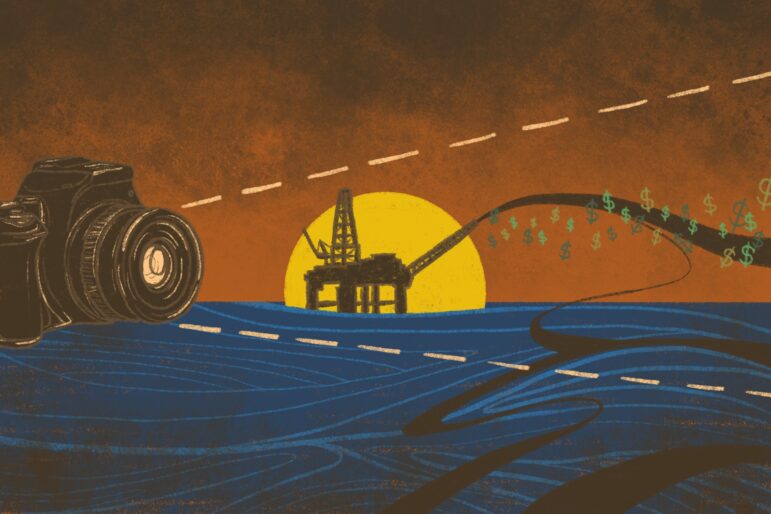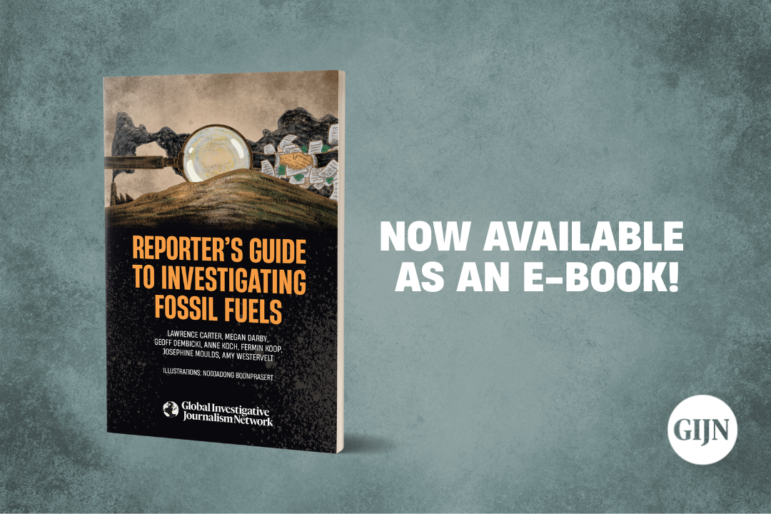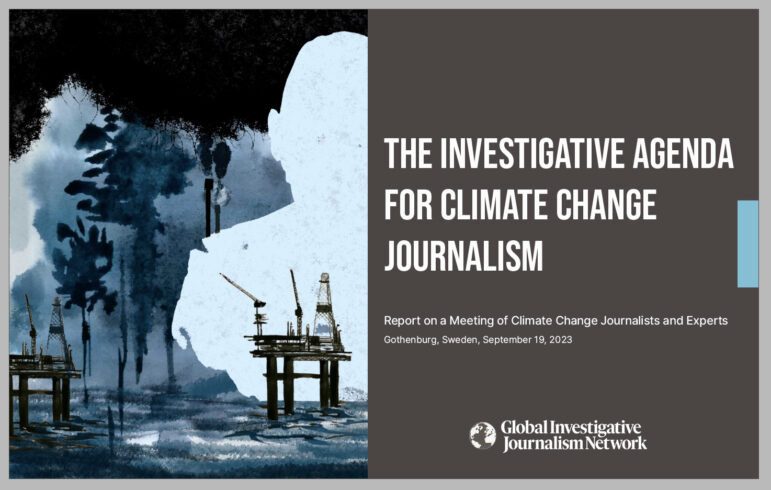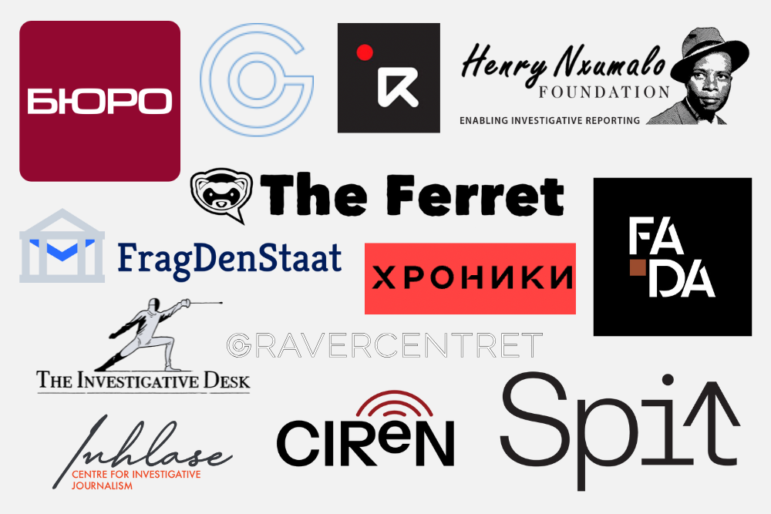

Illustration: Nodjadong Boonprasert for GIJN
Guide to Investigating Fossil Fuels: Introduction
Guide Resource
Guide to Investigating Fossil Fuels
Chapter Guide Resource
Guide to Investigating Fossil Fuels: Introduction
Chapter Guide Resource
Guide to Investigating Fossil Fuels: Private and State-Owned Companies
Chapter Guide Resource
Guide to Investigating Fossil Fuels: Broader Industry Ecosystem
Chapter Guide Resource
Guide to Investigating Fossil Fuels: Lobbying
Chapter Guide Resource
Guide to Investigating Fossil Fuels: Greenwashing
Chapter Guide Resource
Guide to Investigating Fossil Fuels: Government Regulations and Policies
Chapter Guide Resource
Guide to Investigating Fossil Fuels: The Industry’s Future
Chapter Guide Resource
E-Book: Reporter’s Guide to Investigating Fossil Fuels
Fossil fuels, which are largely oil, gas, and coal, account for more than 75% of global greenhouse gas emissions and nearly 90% of all carbon dioxide emissions.
The year 2024 was the warmest year on record globally and the first year in which the average global temperature exceeded 1.5°C above its pre-industrial level, according to the European Union’s Copernicus Climate Change Service. The many consequences include shrinking polar ice caps, rising sea levels, and increasingly severe tropical storms. Vulnerable communities, who contribute little to global warming, bear the brunt of its impact.
Despite the climate crisis, the world is consuming more fossil fuels than ever before; global carbon emissions from fossil fuels “reached a record high in 2024.” This expansion is occurring even though curbing fossil fuel supply and demand, and transitioning to cleaner energy sources are critical to achieving international goals to curb global warming, according to the 2024 Emissions Gap Report from the UN Environmental Programme (UNEP). It is occurring even though many governments and global corporations have made net zero and other climate change mitigation pledges.
Why is this happening and who is responsible?
Fossil fuel companies, through their actions and influence, are central players in this story. The production of fossil fuels is hugely concentrated. Fifty-seven corporate and state entities can be linked to 80% of fossil fuel and cement CO2 emissions from 2016 through 2022, according to a 2024 InfluenceMap report.
Governments are also central players. Yet as UN Secretary-General António Guterres said in June 2024, “Governments are literally doubling down on fossil fuel production; that spells double trouble for people and planet.”
The issue is global, not only because many countries all over the world produce fossil fuels, but because so many of them depend on expensive fuel imports and potentially will be able to save vast sums of money if green forms of energy can be produced locally.
At a GIJN meeting of global climate change journalists in September 2023, 80 climate change journalists and other investigators came together to discuss investigative priorities. At the top of the list was investigating the fossil fuel industry itself. (See conference summary.) Hence the creation of this guide.

Eighty people from 35 countries convened in Gothenburg, Sweden at GIJC23 to map out the future of climate change journalism. Image: Rocky Kistner for GIJN
GIJN’s Guide to Investigating Fossil Fuels
The guide’s aim is to provide context and practical advice to enable better investigations of the fossil fuel industry. The guide has six subject-specific chapters, while the contributors are some of the best in the field. The chapters will be published throughout the week.
- Geoff Dembicki from DeSmog offers guidance on investigating both private and state-owned fossil fuel corporations, highlighting reporting strategies.
- Lawrence Carter of the Centre for Climate Reporting provides insights into uncovering lobbying efforts that influence climate policies.
- Amy Westervelt, executive editor and investigative journalist at Drilled, focuses on exposing greenwashing and disinformation within the industry.
- Megan Darby from the International Institute for Sustainable Development (IISD), delivers expertise on analyzing government regulations and policies affecting the fossil fuel sector.
- Josephine Moulds from The Bureau of Investigative Journalism shares her experience covering the complexities of the fossil fuel industry ecosystem.
- And Fermín Koop of Dialogue Earth offers strategies for assessing and reporting on the climate solutions proposed by the fossil fuel industry.
Together, the authors offer a comprehensive guide, including tips on how to better investigate complex fossil fuel industries worldwide.
As the climate change journalist and environmentalist Bill McKibben said to GIJN: “Climate change journalism has been crucial in helping shift the zeitgeist, and some of that work, some of the really deep investigative work, has been truly, truly important.”
Holding corporations and governments to account — the work of investigative reporters — makes change more possible. Sometimes a single investigative piece can make a real impact. Hidden agendas are exposed. Audiences notice. Policymakers are pressured to act. Engaging audiences on climate change is a challenge. Many approaches and more coverage are needed. Probing reporting is also crucial for impacts, mitigation, adaptation, and solutions.
For other GIJN guides on climate change-related topics see: Extreme Heat, Methane Emissions, Carbon Offsets, Holding Governments Accountable for Climate Change Pledges, and Sea Level Rise.
Acknowledgments
- This guide was a collaboration of investigative journalists and other investigators in the public interest, including writers and subject-matter experts, but it would not have been possible without the generous support of Journalismfund Europe.
- A special thank you to the six subject authors of the guide: Lawrence Carter (Centre for Climate Reporting), Megan Darby (IISD), Geoff Dembicki (DeSmog), Fermín Koop (Dialogue Earth), Josephine Moulds (The Bureau of Investigative Journalism) and Amy Westervelt (Drilled), and thank you to the illustrator Nodjadong Boonprasert.
- We would also like to thank everyone who helped us with a critical review of each chapter: Mark Schapiro, Nimra Shahid, Marcus Baram, and Andrés Bermúdez Liévano.
- The copy-editing was done by Martha Hamilton and Jabeen Bhatti. Fact-checkers who worked on this guide were Margot Williams, Katrina Janco, and Ero Partsakoulaki. Legal advice was provided by The Cyrus R. Vance Center for International Justice.
- A number of GIJN staff played key roles in bringing forth the guide from the idea stage all the way to publication: Former Program Director Anne Koch; Resource Center Senior Advisor Toby McIntosh; Digital Threats Project Director and Spanish Editor Andrea Arzaba; Resource Center Director Nikolia Apostolou; Associate Editor Alexa van Sickle; and Managing Editor Reed Richardson.

Anne Koch is GIJN’s former program director and is currently a journalist and independent consultant. Koch worked as a broadcast journalist and executive for more than 20 years, mostly for the BBC, before becoming a director at anti-corruption NGO Transparency International. Her award-winning career in BBC journalism included service as deputy director of the English World Service and executive editor of the BBC’s flagship radio news and current affairs programs. She has produced or edited over a hundred documentaries.
















